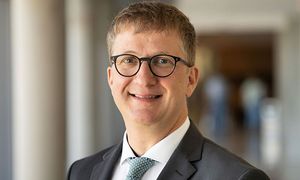
Therapeutic options
Personalized and interconnected
The patient with his or her needs is at the center of our understanding of therapy. In order to meet this aim comprehensively, numerous experts in the psycho-neurological field are available, we also cooperate closely with the various somatic departments of the University Hospital. By integrating inpatient, day-care and outpatient care, the intensity of treatment can be seamlessly adapted to individual requirements.
Core therapies...
The two main elements of the treatment of mental disorders are psychotherapy and pharmacotherapy. Often, initial treatment with medication is the key to gaining access to the psyche and enabling the effective application of one of the many psychotherapy methods offered in our clinic. In individual or group sessions, we address psychological problems and provide practical help for everyday life. We have our own therapeutic drug monitoring (TDM) laboratory to monitor individually optimized drug doses.
...and supplementary therapies
The third therapeutic element in psychiatry comprises a range of supplementary therapies that contribute to the acquisition or regaining of everyday skills and finding alternative forms of expression. While in occupational therapy, procedures for everyday life are practiced and taught, art therapy and music therapy offer new possibilities of expression and the chance to develop creativity. Finally, sports and exercise therapy promote physical well-being and help to find balance. Several relaxation groups we offer also contribute to this further.
Support for mastering everyday life
Social pedagogues are available to provide advice and assistance in regulating social emergencies resulting from illness and in initiating social and work-related rehabilitation procedures. They identify the stress factors of everyday life and search for solutions together with the patient.
In personal contact
We conduct daily rounds and regular one-on-one sessions. These discussions serve to provide supportive, problem-oriented, individual care and advice to patients. If the patient wishes, family members can also be included in these discussions. Family groups and the family consultation in cooperation with the Diakonie provide further support for relatives.
Contact
Prof. Dr. med.
Sebastian Walther M.D.
Head of the Department of Psychiatry, Psychosomatics and Psychotherapy
+49 931 201-77000
Contact
Appointment
Policlinic
Phone: + 49 931 201-77800
E-Mail: ep_poli@ukw.de
In-patient care
Phone: +49 931 201-76050
E-Mail: ep_poli@ukw.de
Address
Klinik und Poliklinik für Psychiatrie, Psychosomatik und Psychotherapie des Universitätsklinikums | Margarete-Höppel-Platz 1 | 97080 Würzburg | Deutschland


